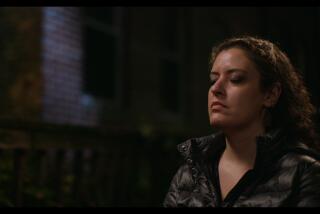Television review: âWhen Love Is Not Enoughâ on CBS
Despite noble efforts by folks like William Shakespeare and Eugene OâNeill, Bill Wilson is probably the best known drunk in literary history. As the co-founder of Alcoholics Anonymous and the coauthor of its iconic âBig Book,â Wilson is both creator and prophet of the now-ubiquitous 12-step program, his story of alcoholic madness and redemption universally known.
And, as is so often the case with influential and/or inebriated men, his wife, Lois, never gets nearly enough credit.
âWhen Love Is Not Enoughâ which premieres Sunday night on CBS, attempts to make amends, but in the end, it simply calls more attention to the problem. A long overdue Hallmark Hall of Fame companion piece to the 1989 Emmy-award winning âMy Name Is Bill W.â (both were written by William Borchert from his books of the same name), âWhen Love Is Not Enoughâ tells the story of Billâs illness and recovery from Loisâ point of view.
Just as âMy Name Is Bill W.â featured marquee names â James Woods, James Garner, JoBeth Williams and Gary Sinise â âWhen Love Is Not Enoughâ stars Barry Pepper and Winona Ryder. Although Ryder may seem like ideal casting â a woman attempting to rebuild her career after her infamous pharmaceutically fueled shoplifting conviction â she lacks, ironically, the emotional heft to anchor the film.
Barely able to convince us that sheâs a woman who has suffered multiple miscarriages much less the wife of a falling-down drunk husband, Ryder appears, until the last quarter of the film, physically and emotionally incapable of evoking the constant, sickeningly hypnotic swing of fear and fury, hope and hopelessness that marks an alcoholic marriage.
Pepper, best known as the devoutly Christian sharpshooter of âSaving Private Ryan,â meanwhile, does his level best. Using his angular grace and haunted eyes to their best advantage, he creates a believable portrait of a man whose slide toward hell stops a hairsbreadth away from the roiling magma. But itâs Loisâ movie, and Ryder, though sweet-voiced and still heartbreakingly lovely, spends most of it looking bewildered. With her period clothing and mannerisms, she looks like a child playing dress up.
When Bill finally gets sober and forms his famous fellowship, Lois realizes that for every man in those smoke-filled rooms, thereâs a woman waiting outside with a story, and a list of resentments, similar to her own. She finally invites them in for a meeting of their own â and Al-Anon is born.
The ideas that recovery from alcoholism is much more complex than a drunk finally quitting the booze or that marriages and families must follow a recovery program as well are among the greatest psychological revelations of the 20th century, affecting millions of people every day. Itâs too bad that Borchert and co-writer Camille Thomasson chose to gallop through the entirety of Loisâ life instead of focusing on the second half. Many women, and men, have survived life with an alcoholic spouse, but few have used the experience to such universal benefit as Lois Wilson did.
More to Read
The complete guide to home viewing
Get Screen Gab for everything about the TV shows and streaming movies everyoneâs talking about.
You may occasionally receive promotional content from the Los Angeles Times.







